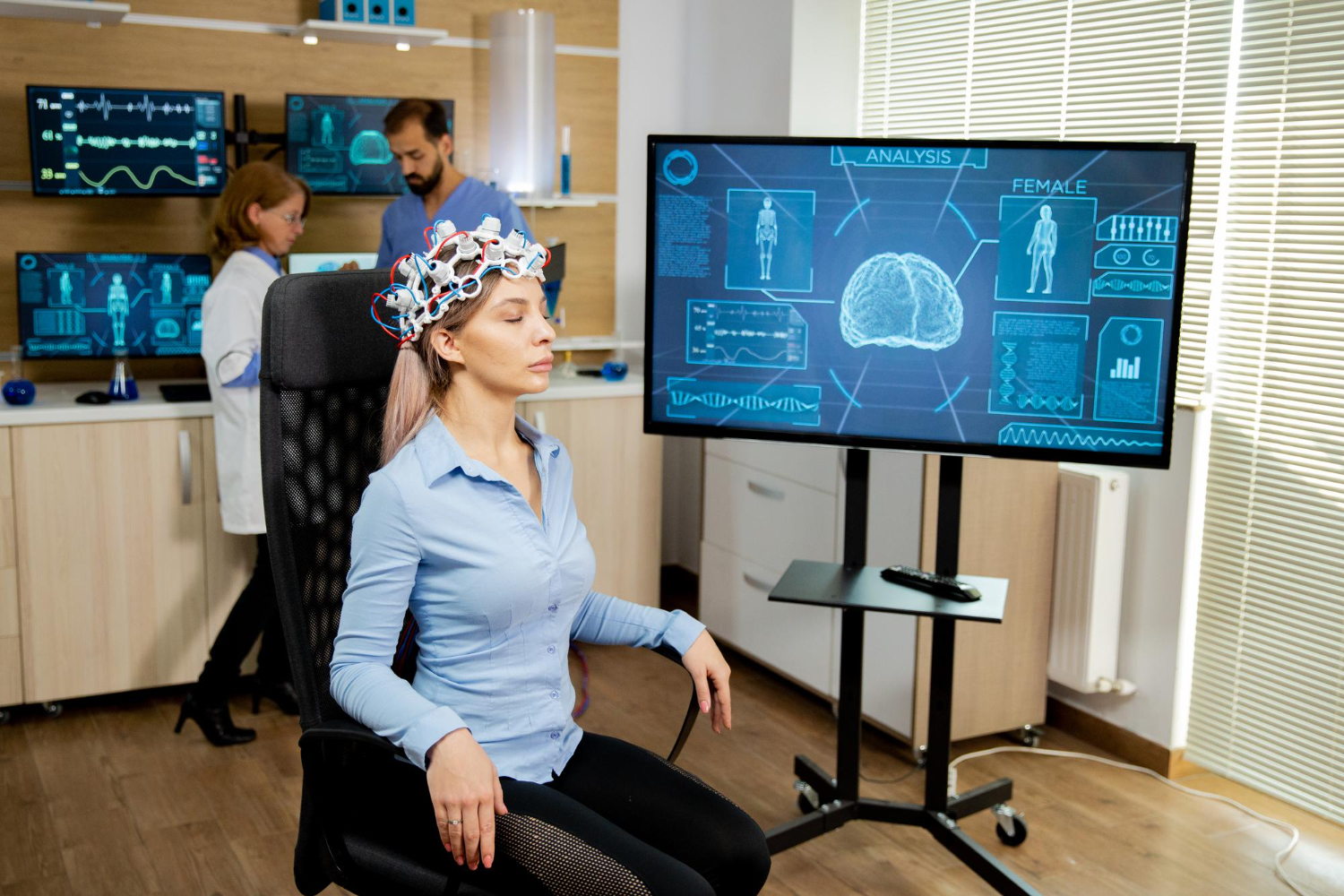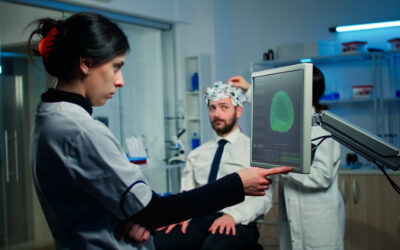The researcher, who teaches at Columbia University, has been driving the establishment of the new National Center for Neurotechnology in his native Spain, which will produce devices capable of accessing and modifying the human mind.
Almost a year ago, an unusual scene took place in the Spanish Congress of Deputies. A small group of deputies sat down to watch the latest film by German filmmaker Werner Herzog, Theater of Thought (2022). The documentary warns that neurotechnology—devices capable of reading or even modifying human brain activity—is about to transform the world forever. The hypnotic voice-over of the director echoed through the halls of the Spanish Congress:
“In the future, will you be able to read my mind and see my next movie before I’ve filmed it?” Herzog asks a researcher in one moment of the film. The neuroscientist Rafael Yuste, who appears in the documentary, was sitting among the Spanish deputies, trying to raise awareness about the risks of penetrating the human mind. His response to the filmmaker’s question is striking: “Probably.”
Yuste, who was born in Madrid 61 years ago, leads the Neurotechnology Center at Columbia University, in the heart of New York City. He tells EL PAÍS that his life changed a decade ago due to an experiment. “Studying the visual cortex of a mouse, we were not only able to decipher what it was seeing but also manipulate its brain activity to make it believe it was seeing things it wasn’t. It was as if we inserted a hallucination into its brain. And the mouse began to behave as though it were really seeing that false image. We manipulated it like a puppet. I didn’t sleep that night,” he recalls via video conference from a suburb of Madrid. “What we can do today in a mouse, we could do tomorrow in a human. We’ve opened the door to very serious ethical and social problems, like what happened to physicist Robert Oppenheimer with the atomic bomb,” he reflects.
The Spanish neuroscientist has spent five years working behind the scenes to shape the future National Center for Neurotechnology, which will be located in a building at the Universidad Autónoma de Madrid. With a promised investment of over 200 million dollars by 2037, it is one of the largest initiatives in the history of Spanish science. Yuste—who defines himself as the “driving force” of the project—explains that he is currently negotiating his appointment as the scientific director of the center.
Question: In an interview you gave three years ago, you said that “in 10 years, wearing a sensor on your head will be the norm, just like everyone has a smartphone today.” Seven years remain. Do you think this will still be the case?
Answer: I don’t know if it will be mandatory, but things are moving incredibly fast. More than a year ago, a team from the University of Technology Sydney (Australia) and a neurotechnology company developed an electroencephalography cap, coupled with a generative artificial intelligence system. They managed to decipher the mental language of volunteers with low average accuracy—around 40%—but with great precision in some cases. There’s a video where you can see how they decode the words someone is generating in their brain: “Good afternoon, I hope you’re well. A cappuccino, please, with an extra shot of espresso.” In reality, we don’t know what a thought is, but we do know the language. [These systems can] decode words that aren’t spoken. The potential is enormous.
Q. What do these researchers intend to achieve?
A. I suppose this Australian company wants to build a system that allows, for example, writing on a computer just by thinking, without using your fingers. I think we are relatively close to that happening… and when it does, it will be a revolution. Imagine wearing one of these helmets or caps: we can generate language internally, have the system decode it, communicate with others, give instructions, operate robotic devices… an entire world will open up to us. We need to anticipate the future that is approaching, in which we will use neurotechnology in everyday life, just like we use smartphones now. This neurotechnology will also enhance our mental and cognitive abilities.
Q. How will it enhance our capabilities?
A. For example, two years ago, a team from Boston University used electromagnetic neurostimulators on participants’ heads to stimulate a part of their brain and increase memory by 30%. It was a control experiment, so it could later be tested on patients with Alzheimer’s or other forms of dementia. Imagine if they start selling something like: “Want better memory? I’ll sell you an electromagnetic stimulator for 1,000 dollars that will enhance your memory.” We are going to find ourselves in a world where, with neurotechnology, we can begin to “touch up” brain activity. Not just decipher it, but change it. We are talking about something very big, because brain activity is the sanctuary of the human mind. Everything we are comes from it: our thoughts, emotions, beliefs, personality, memories. With neurotechnology, we can map and change mental activity. It could have fantastic applications: understanding what happens inside [the brain], developing systems for thought-based categorization, all medical uses… but there are also many risks because with this technology, we are opening the lid of people’s minds. We must ensure that it is fully protected from the beginning.
Q. What will the National Center for Neurotechnology be like?
A. It will have more than 250 researchers and three major departments dedicated to creating neurotechnology: devices for measuring and modifying human brain activity. One department will consist of neurobiologists, using methods of genetics, molecular biology, and cellular biology. Another will consist of neuroengineers, using electronics, magnetics, and acoustics. The third department will focus on artificial intelligence. Then, there will be three smaller departments: one to coordinate clinical trials across Spain to apply neurotechnologies to patients, a small business incubator to generate economic value, and one focused on ethics and human rights. Honestly, there is nothing like this in the world.
Q. The Spanish Ministry of Science has promised 123 million dollars, including 40 million in EU funds. The regional government of Madrid will contribute 80 million dollars, while the Autonomous University of Madrid will contribute a bit more than 2 million dollars. Is this enough money?
A. It’s a fantastic amount. I’ve seen it firsthand, and it’s been something really beautiful that must be shared. With the tragedy of COVID, which devastated Spain, European funds arrived to rebuild the technological, industrial, and scientific fabric. A historic opportunity has opened up for Spanish science, and the two most opposing administrations you can imagine have reached an agreement. They have put science above their differences. I’ve met with Isabel Díaz Ayuso and Pedro Sánchez several times, and I have no complaints. They’ve given everything they needed to and more.
Q. A couple of months ago, you and two colleagues warned that companies like Meta —owner of WhatsApp, Instagram, and Facebook— and Apple have already patented, or are developing, wearable neurotechnologies that will soon hit the market with an unprecedented global reach. These companies, then, are already invading that sanctuary of the human mind.
Q. Yes, small things are already being done, although they are still in the early stages. That’s why it’s so urgent to protect mental privacy because right now, there are many neurotechnology companies worldwide that are already collecting “brain data” from users. They are selling devices that help with better sleep, meditation, playing video games, controlling drones with thoughts, moving a cursor on a computer screen…
I’m concerned that these companies are hoarding all this data. It’s already possible to begin deciphering it, as was done in Australia, because artificial intelligence is improving spectacularly. It’s just a matter of time.
Q. Are you afraid that, for example, if you buy a video game with a headset that reads your mind to move a cursor, the reading might reveal that you suffer from anxiety and that information might end up in the hands of an insurance company?
A. Yes, in principle, this could already happen. Medical devices in the United States are regulated by the Food and Drug Administration… the problem is with those intended for mass consumption. In April 2024, our foundation published a study about consumer neurotechnology companies. Our legal team read the fine print of all the contracts users must accept in order to turn on the device or download the software. It’s a disaster. If you click “accept,” the 30 companies own all your neural data. And almost all the companies allow themselves to sell that data to third parties, which could be an insurance company, or the North Korean military. It’s the least secure situation you can imagine. Since there are no laws, companies say, “Well, for now, I’ll keep everything and authorize myself to sell it.” This situation concerns me a lot. This loophole needs to be closed immediately.
Q. You say the five basic neuro-rights are: mental privacy, fair access to cognitive enhancement, preservation of personal identity, protection against biases, and the maintenance of free will.
A. That’s right. Of the five, the most urgent is mental privacy, because, as I said, nowadays you can buy an electroencephalography helmet on Amazon to play online, and all that data is monopolized by the company that sold it to you. This needs to be stopped immediately. However, regardless of the urgency, the neuro-right that I would prioritize in terms of importance is fair access to cognitive enhancement. Sooner or later, we’ll have to deal with this problem. We will have the possibility to improve ourselves [cognitively]… and this will create a divide in society. There will be two types of humans: some enhanced, and others not. We need to start thinking now about how to prevent a fracture in humanity.
Q. Technically, when could that happen?
A. I think it will happen gradually. Perhaps memory-enhancing devices might be the first step. I don’t know exactly when it will occur, but I see it happening in just a few years.
Q. You are the president of the Neurorights Foundation, which works to raise awareness about the ethical implications of neurotechnology.
A. We have already managed to get brain activity protected by law in four places around the world. First, Chile, which became the first country in the world three years ago to protect its citizens’ brain activity. Then, in 2023, the Brazilian state of Rio Grande do Sul did the same. And in 2024, we managed to get two states in the United States, Colorado and California, to pass laws that protect brain data. Bill proposals are also being discussed in Uruguay, Ecuador, Mexico, and Brazil at the federal level.
Q. And in Spain?
A. In Spain, nothing has been done yet, but there have already been two meetings. The first was in February, in the Congress of Deputies. There was a very positive attitude from all political parties. And, a couple of weeks ago, the Senate invited me to speak at the Science Committee. If all goes well, we will start working with legislators in 2025 to see if Spain can also join this movement and lead it at the European level. Spain would be the first country in Europe to have specific legislation to protect brain activity. The best solution would be to establish global regulation, with a United Nations agreement and a specialized body, like the International Atomic Energy Agency (IAEA)… but that is a very complicated and long-term goal.
Q. You are one of the 12 members of Spain’s Research Ethics Committee. This body has reviewed the case of the rector of the University of Salamanca, Juan Manuel Corchado. He and his colleagues have had 75 studies retracted for fraudulent practices, but he has said he will not resign. The local newspaper La Gaceta de Salamanca published an article stating that it is actually the ethics committee that lacks ethics…
A. I can assure you that all the deliberations we have had have been scrupulously ethical and respectful of the rights of the rector of the University of Salamanca.
Q. The ethics committee has been criticized by the rector’s environment for allegedly being politicized in favor of the ruling Socialist Party. However, you were appointed to the committee by the regional government of Madrid, led by Isabel Díaz Ayuso from the conservative People’s Party.
A. That’s right, I represent the Community of Madrid in the Ethics Committee. We represent the citizens, and we have no political affiliation. I can assure you that there is no lack of ethics in the Committee; that would be the last straw…
El diario EL PAÍS is one of the most important newspapers in Spain and the Spanish-speaking world. It was founded on May 4, 1976, in Madrid, shortly after the death of Francisco Franco, and has played a key role in Spain’s transition to democracy.






0 Comments